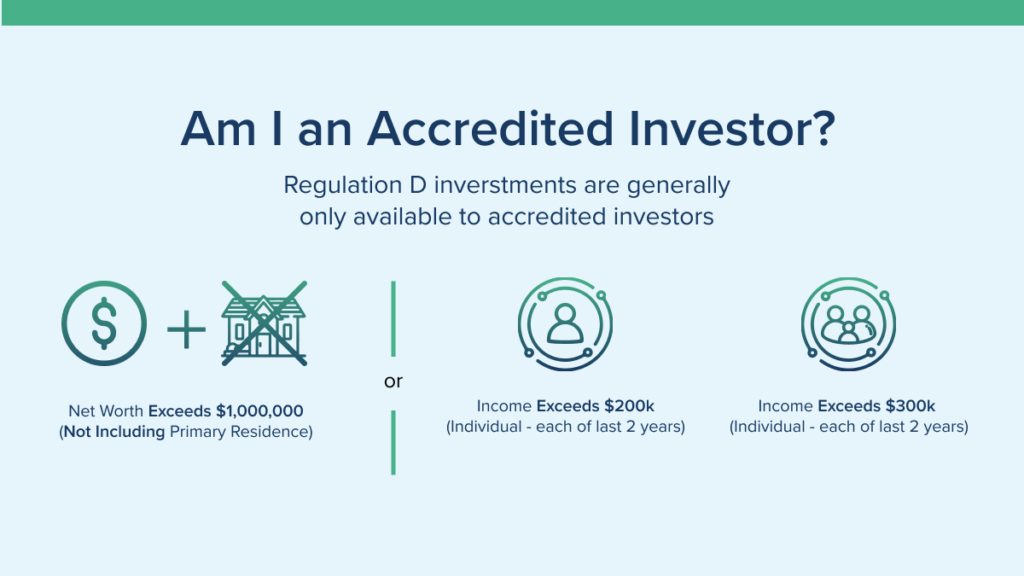What Is an Accredited Investor?
Accredited investors are an individual or business company that can deal in securities that are not able to be registered with a financial authority. Accredited investors are granted the privilege of access to securities by meeting some minimum requirement in regards to their net worth, income assets, size of the asset, the status of their governance, or well-qualified knowledge.
The U.S., the term accredited investor is a term used to refer to accredited investors by the Securities and Exchange Commission (SEC) under Regulation D to describe investors that are financially sophisticated and do not have the necessity for the security offered through regulatory disclosure filings. Accredited investors comprise high-net worth individuals (HNWIs) and banks. They also include insurance brokers, as well as trusts.
Key TakeAways
The type of offering for shares is known as an private placement. This type of offering could expose these investors to significant risk. This is why authorities should assure that these investors have a solid financial foundation, are experienced and educated about the risks they take on.
If companies choose to sell their securities for accredited investors to invest in, the task of the regulatory authority is restricted to confirming or providing the required guidelines to establish guidelines to define who qualifies for accreditation as an investor. The regulatory authorities benefit to determine whether the person applying is financially able and the knowledge required to manage the risks associated with making investments in securities not registered.
Accredited investors also enjoy privilege acces also to the venture capital, hedge funds, angel investments as well as deals that involve complicated and high-risk investments as well as instruments.
Requirements for Accredited Investors
- The requirements regarding accredited investors differ in each jurisdiction different and are typically determined by the local regulator of the market or authorized authority. In the U.S the definition of accredited investor is defined by the SEC as outlined in Rule 501 of Regulation D.
- For being an accredited investment investor an individual has to earn an annual salary that is greater than $200,000 ($300,000 in joint earnings) in the past two years, with the intention of making the same or more substantial income during the present year. A person must have an income that is above the threshold, both on their own or in conjunction with a spouse for the two previous years. Income tests can’t be met by displaying the first year of income for an individual and two more years of income shared in the presence of the partner.
- An individual is considered an accredited investor when they possess an net value that exceeds $1 million whether as an individual or in conjunction along with spouse. It is not possible to count the main residence. The SEC will also determine that a person is an accredited investor when they’re a general partner or executive officer or director for the entity who is the one issuing the registered security.
- A company is an accredited investor when it’s a private development firm or a company with assets that exceed $5 million. Additionally, if the company is made up of equity holders who can be accredited investors then the company itself can be considered recognized as an accredited investment. However the entity cannot be established solely with the intention of buying particular securities.
- If an individual can show enough education or work experiences that demonstrate their competent expertise in not registered securities, then they could be considered to be an approved investors.
Recent Changes to the Accredited Investor Definition
Recently in the past, it was announced that the U.S. Congress modified the definition of accredited investor to encompass accredited investment advisors and registered brokers.
The 26th of August. 26, 2020 The U.S. Securities and Exchange Commission changed the definition of accredited investor. According to a press release “the amendments allow investors to qualify as accredited investors based on defined measures of skillful knowledge, experience or certifications in addition to the existing tests for income or net worth. The amendments also expand the list of entities that may qualify as accredited investors, including by allowing any entity that meets an investments test to qualify. ”
Alongside other types in there are other types of categories. SEC has expanded the definition of accredited investors as those who hold specific skillful qualifications, certifications, or qualifications; those with the status of “knowledgeable employees” of a private investment fund, as well as SEC- as well as state-registered investment advisers.
Purpose of Accredited Investor Requirements
The regulatory authorities of any market has the responsibility of building investment, and protecting investors. In one sense, the regulators are obligated to encouraging investments in risky ventures as well as business ventures because they hold the potential of being multi-baggers in the near future. They are also risky because they might be focused on mere concept research and development that do not have a product for sale, which could be prone to a higher probability of failing. If they succeed and profitable, they will help in providing a substantial reward to their investors. However, they have the potential for failure.

Accredited Investor by “My True Seller”
In contrast regulators must protect individuals who are less knowledgeable and might not be able to cover the losses of a large loss or comprehend the risks that come in their investments. Thus, providing accredited investors gives access to those who have the financial resources in addition to investors with a solid understanding and experienced.
There isn’t a formal procedure to become an accredited investor. It is, rather, the responsibility of sellers of securities that they sell to comply with several procedures to confirm the authenticity of organizations or individuals that wish to be considered recognized investors.
People or entities who wish to become accredited investors may reach out to the company that issued the non-registered securities. The issuer could require the person to answer an assessment questionnaire in order to determine whether the person is qualified as an accredited investment. The survey may ask for a variety of attachments, including account information, financial statements along with the account balance for verification of the qualifications. The list of attached documents can include taxes returns, W-2 forms, salary slips or even reviews written of CPAs and tax attorneys. financial brokers and advisors. Furthermore, the issuers could review individuals’ credit score to make an more evaluation.
Example of an Accredited Investor
Consider, for instance, that you have a person whose earned $150,000 in the past three years. They have a home with a worth 1 million (with an outstanding mortgage of $200,000) and a vehicle valued at 100,000 (with outstanding loans of $50,000) and an 401(k) account worth $5000, as well as a savings account that has 450,000. Although this person fails the test of income however, they’re a qualified investment alike in the tests for net worth. However, this test cannot be a factor in the worth of one’s principal home. Net worth is measured as assets less liability.
This individual’s net worth is $1 million. It is based on a computation of the assets (other that their main home) that is $1,050,000 ($100,000 plus $500,000 plus $450,000) less a credit card equivalent to $50,000. If they satisfy the requirement for net worth the can be considered an investor who is accredited.
Who Qualifies to Be an Accredited Investor?
The SEC defines an accredited investor to be:
- A person with a net earnings exceeding $200,000 for both of the most recent years, or with the joint earnings of an individual or a couple that exceeds $300,000. Then, there is an reasonable expectation of that same level of income during the year in which they are.
- an individual whose total net worth, also known as the the joint net worth, if the person is a partner or spouse, exceeds $1,000,000, which excludes the person’s main place of residence.
- Are There Any Other Ways of Becoming an Accredited Investor?
- Certain circumstances may warrant accreditation as an investor can be given to a company’s executives, directors, or general partners when the company is the one that issues the securities that are being provided or purchased. In certain instances the financial well-qualified who holds the FINRA Series 7, 65 or 82 may also be an accredited investment advisor. There are extra options that aren’t as important, for instance, a person who manages a trust that has greater than $5 million worth of capital.
What Privileges Do Accredited Investors Receive That Others Don’t?
According to federal laws on securities Only accredited investors are able to take part in certain offerings of securities. They could be the shares of private placements as well as structured products, as well as hedge funds or private equity as well as hedge funds, among other things.
Why Do You Need to Be Accredited to Invest in Complex Financial Products?
One of the reasons these products only available for accredited investors is that they warrant that investors who participate have the financial expertise and are capable of surviving or endure periods of volatility, or even the possibility of big losses, eliminating the protections from regulation which are provided by an officially registered offering.
What If I Lie About Being an Accredited Investor?
It’s your duty to present yourself in a truthful manner in opening a bank account in addition to the company that is providing you with the account to conduct its full investigation to assure that you’re telling what is true (e.g. soliciting the tax return or statements from banks/brokers to confirm your income and the assets).
The Bottom Line
The Accredited Investor rules were intended to safeguard prospective investors with a lack of understanding of finance from risky investments and the losses they might be inadequately prepared for. On the other hand this gives those beginning with substantial financial assets an advantage over people with moderate financial assets.


One thought on “Master the 5 New Qualifications Every Accredited Investor Must Know”